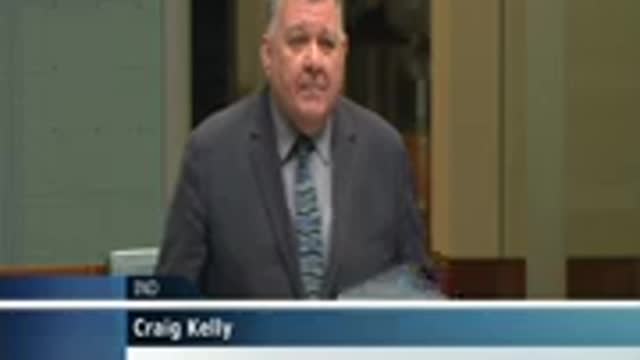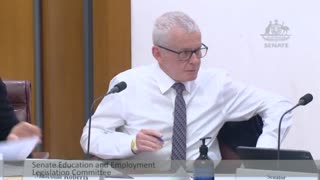Premium Only Content

Ivermectin - Australia - House of Reps - June 22 2021
Mr CRAIG KELLY (Hughes): To start my contribution on the COVID-19 Disaster Payment (Funding Arrangements) Bill 2021, I’d like to pick up from where the member for Dunkley left off about the changing health advice. It is correct that the health advice on the vaccination program has changed. But what that actually shows is how mistaken it would have been to follow the advice of members of the opposition who wanted to rush out the vaccine in the earlier days.
Their call was that we must get more injections into the arms of people. But, because of that rushing out, we now have in this country 800,000 Australians who have been injected with a substance which our Chief Medical Officer now says poses greater risks to them than any potential benefit that they have received. That is historic proportions—that 800,000 Australians would be subject to a medical treatment where the Chief Medical Officer of the country now acknowledges that the risk to those people was greater than the benefits they received. And we know that dozens of those people have suffered from blood clots. This is the mistake that can happen when we panic and we rush, which was exactly the call that we heard from members of the opposition.
When it comes to working out our steps and procedure in tackling COVID, surely we must look at all the evidence. The first place that we might look to is a group called the National COVID-19 Clinical Evidence Taskforce. I have been critical of this task force in the past. However, it is interesting to note their latest findings on ivermectin. I know that members of the opposition have called ivermectin snake oil and they have said that it doesn’t work.
Well, let’s have a look at what the National COVID-19 Clinical Evidence Taskforce says about this. They say: ‘Evidence comes from 13 randomised trials in over 1,260 adults.’ So they’re actually getting up there in the number of randomised trials and the number of adults. What does our national evidence task force find? Surprise, surprise, they found a 67 per cent reduction in death in those who were administered ivermectin who caught COVID as compared to those that weren’t—a 67 per cent reduction in death. They’ve also found a 46 per cent reduction in ICU admissions. That’s what they found. Yet, despite those amazing figures, which show an almost 50 per cent decline in ICU admissions and a 67 per cent decline in death, our national clinical evidence task force somehow still recommends against ivermectin.
There is evidence that’s now on the table, including the international peer reviewed evidence published only a few days ago in the American Journal of Therapeutics—a Cochrane standard, peer-reviewed meta-analysis, for the education of the members sitting over to my right—by researchers over in the UK. We’ve heard that apparently some of these studies that are not done in the UK should be discounted, but this is actually a peer reviewed meta-analysis from the United Kingdom by Bryant and Lawrie. What did they find on ivermectin? I’ll quote directly. They said that ‘meta-analysis of 15 trials found that ivermectin reduced risk of death compared with no ivermectin’ by 62 per cent in their study of 2,438 patients. They also found that ‘ivermectin prophylaxis reduced COVID-19 infections by an average of 86 per cent’.
I put it to you, Deputy Speaker, that it is now game over for the ivermectin deniers with this peer-reviewed metanalysis study. All those on the other side who continue to deny ivermectin are putting Australian lives at risk.
The evidence is clear. The evidence is here. These people love to say, ‘We must have peer-reviewed studies.’ Well, here it is: a peer reviewed meta-analysis of 15 studies showing a 62 per cent reduction in the risk of death and an incredible 86 per cent reduction of COVID infections when used as a prophylaxis. Let me read the final conclusion of this meta-analysis, peer-reviewed published study:
Given the evidence of efficacy, safety, low cost and current death rates, ivermectin is likely to have an impact on health and economic outcomes of the pandemic across many countries. Ivermectin is not a new and experimental drug with an unknown safety profile. It is a WHO ‘Essential Medicine’ already used in several different indications, in colossal cumulative volumes.
And those volumes are in the billions of doses. It continues:
Corticosteroids have become an accepted standard of care in covid-19, based on a single RCT of dexamethasone 1. If a single RCT is sufficient for the adoption of dexamethasone, then … two dozen RCTs supports the adoption of ivermectin.
Ivermectin is likely to be an equitable, acceptable and feasible global intervention against covid-19. Health professionals should strongly consider its use, in both treatment and prophylaxis.
There you have it. That is the peer reviewed science. The denial of ivermectin must end, because it is costing lives in this country. Those on the other side must take off their tinfoil hats and follow the science, not the superstition and not the rumours. We know that many have spoken out against this drug because it’s low cost. We know that many have invested financial interests in trying to suppress its use and these studies, because there are billions involved in it.
It doesn’t stop there. Not only is there that peer-reviewed study; there is another study which summarises all the ivermectin studies. I’d like to go through what the numbers actually are here. There are 25 early treatment studies, and 23, 92 per cent of them, report positive effects. The random chance of that happening is one in 103,000. For late treatment, there are 21 studies, and 90.5 per cent of them show it’s an effective treatment. The random chance of that is one in 9,000. For prophylaxis, there are 14 studies and all 14, 100 per cent of them, show it’s an effective treatment. The random chance of that is one in 16,000. In total, there are 60 studies and 56 of them, 93.3 per cent, report a positive effect, and the random chance of that happening is estimated at—wait for it—one in two trillion. So, you on the other side, may well be right: this may all just be a lucky coincidence! There’s a one in two trillion chance that you are right that ivermectin is an ineffective treatment, because that is what the numbers, that is what the evidence, that is what the data, actually says!
I would like to conclude: if you want to read one particular peer-reviewed study on the effectiveness of ivermectin, I suggest to you a study published last year in the Journal of Biomedical Research and Clinical Investigation. In that study, which was across four hospitals in Argentina, they had two groups. They had 407 hospital workers —doctors and nurses and orderlies—in their standard PPE equipment and they had another group of 788, again doctors and nurses and orderlies, which they gave ivermectin to. So we had an ivermectin group and a non-ivermectin group. Of the 407 in the non-ivermectin group, 237 of them, 58 per cent, in a three-month period, contracted COVID. Understand that Argentina is not a wealthy country, not as wealthy as we are here in Australia.
Their hospitals were overcrowded, COVID was rife through their society and, of the nurses and doctors in those hospitals that didn’t take ivermectin in that study period, 58 per cent of them became infected. But of the 788 that took the ivermectin treatment, can you guess how many contracted COVID, remembering it was 58 per cent of the other group? It was zero, a duck egg. Not one single person, not one single doctor, not one single nurse, not one single orderly, contracted COVID, and yet in the other group they had 58 per cent contract it. I think that I have given enough evidence here tonight that ivermectin must be adopted widely in this country. Looking at results across the board in countries like India and at how successful they have been in crushing their COVID curves with ivermectin, it must be adopted widely in this country. It is an effective treatment.
I would like to conclude that, unfortunately, because of the words I have spoken, because of the evidence that I have read out, if I were to put this speech during the proceedings here on the floor of the Australian parliament on YouTube, it would be censored and deplatformed by YouTube. They would take it down. They would look at it and they would question the proceedings of this parliament, question this debate. This speech cannot be put up on YouTube because of their censorship.
Full Video: (18:34)
https://parlview.aph.gov.au/mediaPlayer.php?videoID=546098&operation_mode=parlview#/4
-
 8:52
8:52
Australian Parliament Senate Committee Media Briefings
1 year agoSenator Roberts grills Pfizer on mandates
2391 -
![Batman Arkham Knight [4K + Mods] Hardest Difficulty ⋆ Western Re-tread](https://1a-1791.com/video/fww1/ca/s8/1/7/9/T/V/79TVy.0kob-small-Batman-Arkham-Knight-4K-Mod.jpg) LIVE
LIVE
FusedAegisTV
3 hours agoBatman Arkham Knight [4K + Mods] Hardest Difficulty ⋆ Western Re-tread
723 watching -
 2:47:06
2:47:06
Barry Cunningham
5 hours agoPRESIDENT TRUMP PROTECTED AMERICA AND NOW THE WORLD AND THAT DEMOCRATS KNOW!
30.6K38 -
 21:53
21:53
Stephen Gardner
4 hours ago🔥What EVERYONE missed about Trump bombing Iran!
43.8K295 -
 LIVE
LIVE
TwinGatz
1 hour ago🔴LIVE - Sunday Squads w/ The Boys | ARMA Reforger | Time For Peace
40 watching -
 LIVE
LIVE
Shoriantrax
2 hours agoGOON WIPED. BAGS MAXED. | Tarkov Raid With ShoriAntrax
79 watching -
 27:30
27:30
DeVory Darkins
4 hours ago $11.48 earnedDemocrats panic with IMPEACHMENT threat as Trump drops WARNING for Iran
32.9K133 -
 LIVE
LIVE
Palermozeto
3 hours agoSplitgate 2: OG's Are About to Take the Lead, Time to Do Our Part!! Very Fun Battle Royale Come See!
114 watching -
 1:28:55
1:28:55
LumpyPotatoX2
2 hours agoHunt: Showdown | Quick Sunday Runs - #RumbleGaming
1.75K -
 15:53
15:53
Forrest Galante
14 hours agoPrivate Tour of India’s Best Secret Aquarium
63K7